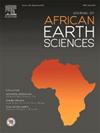Geochronological assessment of the Arabian-Nubian Shield plutonic intrusions in the arc assemblages along the Qift-Quseir transect, Central Eastern Desert of Egypt
IF 2.2
4区 地球科学
Q2 GEOSCIENCES, MULTIDISCIPLINARY
引用次数: 0
Abstract
The ophiolitic mélange and granitic intrusions along the Qift‒Quseir transect in the Central Eastern Desert (CED) of Egypt are parts of the Egyptian Nubian Shield (ENS), which is the northern segment of the East African Orogeny (EAO). The Arabian-Nubian Shield (ANS) is the longest Neoproterozoic belt on Earth, and it was formed during the East and West Gondwanaland collisions within the framework of the EAO. The ANS basement rocks were developed during three distinct phases of magmatic activity: the island arc and syn-collisional phases, identifying a compressional tectonic regime, and a post-collisional phase that identifies changing the tectonic regime into an extensional type. The geochronological assessment of these magmatic activities is essential for understanding the regional geology and tectonic development of the ANS. In our study, we dated different rock units along the Qift‒Quseir transect and revealed ages ranging from the Late Tonian (820 ± 8 Ma) to the Late Ediacaran (563 ± 4 Ma). These ages were associated with three different magmatic pulses: (1) a seafloor spreading and island arc phase (ophiolite and related rocks), represented by sample QQ05, which was dated from 820 ± 8 Ma; (2) a syn-collisional phase, represented by samples QQ08 and QQ10, dated from 733 ± 10 Ma and 729 ± 10 Ma, respectively; and (3) a post-collisional phase, represented by all the other samples, dated from the Ediacaran at 603 ± 9 Ma to 563 ± 5 Ma. These results showed that the post-collisional phase was dominant, especially in terms of the alkali-feldspar granites, relative to ophiolitic rocks, and the syn-collisional granites in the CED. Initiation of the Dokhan Volcanic eruptions at 639 ± 2 Ma gave us the date of the compressional-to-extensional tectonic transition setting, and the post-collisional tensional regime was activated at 603 ± 9 Ma. Additionally, we identified evidence of local magmatic sources by dating 11 grains of Paleo-to Meso-Proterozoic xenocrysts with ages ranging from 1876 ± 18 to 1070 ± 13 Ma (i.e., components of the pre-Arabian-Nubian Shield).
埃及中东部沙漠 Qift-Quseir 断面沿线弧形集合体中的阿拉伯-努比亚盾质侵入体的地质年代评估
埃及中东部沙漠(CED)Qift-Quseir 断面沿线的蛇绿混杂岩和花岗岩侵入体是埃及努比亚地盾(ENS)的一部分,而埃及努比亚地盾是东非造山带(EAO)的北段。阿拉伯-努比亚地盾(ANS)是地球上最长的新近纪地带,形成于 EAO 框架内的东西冈瓦纳陆碰撞时期。ANS基底岩石是在岩浆活动的三个不同阶段形成的:岛弧和同步碰撞阶段,确定了一种压缩构造体系;后碰撞阶段,确定了构造体系向扩展类型的转变。对这些岩浆活动的地质年代评估对于了解 ANS 的区域地质和构造发展至关重要。在我们的研究中,我们对 Qift-Quseir 断面沿线的不同岩石单元进行了年代测定,结果显示了从晚托尼安(820 ± 8 Ma)到晚埃迪卡拉(563 ± 4 Ma)的不同年代。这些年龄与三个不同的岩浆脉冲有关:(1) 海底扩张和岛弧阶段(蛇绿混杂岩和相关岩石),以样本 QQ05 为代表,年代为 820 ± 8 Ma;(2) 同步碰撞阶段,以样本 QQ08 和 QQ10 为代表,年代分别为 733 ± 10 Ma 和 729 ± 10 Ma;(3) 后碰撞阶段,以所有其他样本为代表,年代从埃迪卡拉纪的 603 ± 9 Ma 到 563 ± 5 Ma。这些结果表明,碰撞后阶段占主导地位,尤其是相对于蛇绿岩的碱长石花岗岩和CED中的同步碰撞花岗岩而言。多汗火山喷发开始于 639 ± 2 Ma,这为我们提供了从压性构造向伸展构造过渡的时间,而碰撞后的张性构造则开始于 603 ± 9 Ma。此外,我们还通过对 11 个年龄在 1876 ± 18 至 1070 ± 13 Ma 之间的古生代至中新生代异长岩(即前阿拉伯-努比亚地盾的组成部分)进行年代测定,确定了当地岩浆源的证据。
本文章由计算机程序翻译,如有差异,请以英文原文为准。
求助全文
约1分钟内获得全文
求助全文
来源期刊

Journal of African Earth Sciences
地学-地球科学综合
CiteScore
4.70
自引率
4.30%
发文量
240
审稿时长
12 months
期刊介绍:
The Journal of African Earth Sciences sees itself as the prime geological journal for all aspects of the Earth Sciences about the African plate. Papers dealing with peripheral areas are welcome if they demonstrate a tight link with Africa.
The Journal publishes high quality, peer-reviewed scientific papers. It is devoted primarily to research papers but short communications relating to new developments of broad interest, reviews and book reviews will also be considered. Papers must have international appeal and should present work of more regional than local significance and dealing with well identified and justified scientific questions. Specialised technical papers, analytical or exploration reports must be avoided. Papers on applied geology should preferably be linked to such core disciplines and must be addressed to a more general geoscientific audience.
 求助内容:
求助内容: 应助结果提醒方式:
应助结果提醒方式:


